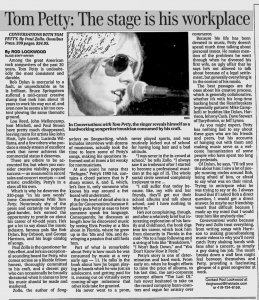Tom Petty: The stage is his workplace
By Rod Lockwood
Toledo Blade - Sunday, January 8, 2006
CONVERSATIONS WITH TOM PETTY. By Paul Zollo. Omnibus Press. 330 pages. $24.95.
Among the great American songwriters of the past 20 years, Tom Petty is undoubtedly the most consistent and durable.
Bob Dylan is mercurial to a fault, as unpredictable as he is brilliant. Bruce Springsteen suffered a mid-career creative slump that took him about 10 years to work his way out of, and even now he seems a bit too content flowing the same thematic ground.
Lou Reed, John Mellencamp, Joni Mitchell and Paul Simon have pretty much disappeared, leaving room for artists like John Hiatt, Lyle Lovett, Lucinda Williams, and a few others who produce a steady stream of excellent work that never achieves the commercial status it deserves.
There are others to be accounted for, but when you consider creative viability, popular success -- as measured in record sales and concert receipts -- and artistic credibility, Petty's in a class all his own.
Which is why he deserves the 330-page "in his own words" tome Conversations With Tom Petty. Notoriously shy of the press and certainly no industry glad-hander, he's earned the opportunity to prattle on about his career of 40-odd years. He's got a lot to say about the music industry, famous pals like Bob Dylan, Roy Orbison, and George Harrison, and his huge catalog of hits.
Paul Zollo is the questioner for this effort, and he's an exceptional sounding board for Petty, who comes across as a likable fellow; honest, thoroughly committed to his craft, and a decent guy who can occasionally be brutally dictatorial when it comes to how his music should be made and marketed.
Zollo, the author of Songwriters on Songwriting, which includes interviews with dozens of musicians, actually took the time to learn some of Petty's songs, making his questions informed and at times a bit wonky for nonmusicians.
At one point he notes that "Refugee," Petty's 1980 hit, contains a chord pattern that is F sharp minor, A, and E, which, let's face it, only someone who knows his way around a fret board will understand.
But this level of detail also is a plus for Conversations because it clearly puts Petty at ease to have someone speak his language, Consequently, he discusses at length how he discovered music by seeing Elvis Presley at a film shoot in Florida, where he grew up in the '50s and '60s, and developing a passion that still fuels him.
Part of what is remarkable about Petty is how much he was consumed by music at a very early age -- 11. He talks in the book about how he began playing in bands when he was just an adolescent, and getting paid for it, missing out on virtually every coming-of-age milestone that other kids take for granted.
He never went to a prom, never played sports, and was routinely kicked out of school for having long hair and a bad attitude.
"I was never in the in-crowd at school," he tells Zollo. "I always saw it as irrelevant after I started to become a professional musician at the age of 15. The whole social circle seemed completely irrelevant to me...
"I still suffer that today because, like, my wife and her friends, they'll get out their school albums and talk about school, and I have nothing to relate to."
He's not complaining, though, and after a relatively brief but interesting exploration of his family and childhood, the book digs into his career, which took him from obscurity in Florida in the mid-'70s to a huge following and a string of hits like "Breakdown," "I Won't Back Down," and "You Don't Know How It Feels."
Petty's story is one of determinism an hard work. From early on, when he fought efforts to raise the price of albums, to his last disc, the anti-corporate concept album "The Last DJ," he's never hesitated to take on the record company bean-counters and argue for artistry over commerce.
Because his life has been devoted to music, Petty doesn't spend much time talking about personal issues. He makes mention of the problems he went through when he divorced his first wife, an ugly affair that he says he's not allowed to talk about because of a legal settlement, but generally everything is in the context of his music.
The best passages are the ones about his creative process, which is generally collaborative, whether it's with his long-time backing band the Heartbreakers (especially guitarist Mike Campbell) or buddies like Dylan, Harrison, Johnny Cash, Dave Stewart of Eurythmics, or Jeff Lynne.
As you might expect, Petty has nothing bad to say about these guys who are his friends and peers, but his accounts of hanging out with them and making music serve as a welcome humanization of some people who have spent too long on pedestals.
Of Dylan, he says, "I'll tell you this about him: I saw a lot of people running circles around Bob, being afraid of him, or afraid to say what was on their mind. Trying to anticipate what he was trying to say or do. I always found that if I asked Bob a direct question, I would get a direct answer. So maybe our friendship wasn't that difficult because I made up my mind that I would treat him like anybody else."
Conversations works because Petty and Zollo treat everything, from writing songs with Harrison to making groundbreaking music videos to why you'll never catch Petty shaking hands with fans after a concert, as simply a guy doing his job. The result breaks down a wall fans might feel between themselves and Petty, providing a fascinating glimpse of a great songwriter at work.

